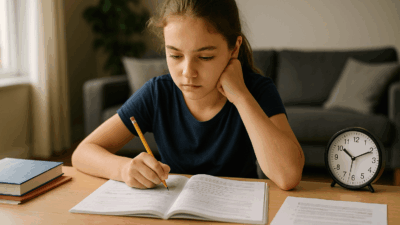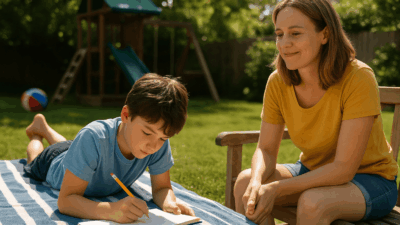“I just want to scream sometimes. Everyone’s posting beach photos while we’re arguing over practice papers. Am I ruining their childhood or setting them up to fail?” – Sarah, mum of Year 5 twins
Sound familiar? You’re not alone. That gnawing doubt about whether you’re doing too much – or not enough – for the 11+ during summer is keeping thousands of parents awake at night.
The Summer 11+ Dilemma: What’s Really at Stake
It’s 7:30 am on a glorious July morning. The sun is streaming through the blinds, the children are finally on holiday, and you’re staring at a stack of 11+ papers with a knot in your stomach.
- Should you wake them up to do some practice?
- Should you let them sleep in and enjoy their break?
- What will happen if they don’t practice enough?
- What will happen if they practice too much?
Research from educational psychologists shows that children retain information better with spaced practice and adequate rest between learning sessions. Studies from UC San Diego demonstrate that spaced practice can improve long-term retention by 150-200%, with students retaining 80% of material after a week compared to just 34% with traditional cramming methods.
The path you choose this summer will affect more than just exam results – it will shape their memories, their relationship with learning, and even how they handle pressure for years to come.
Finding Your Child’s Success Formula (Not Your Neighbor’s)
But here’s what specialists know that many parents don’t: the ideal amount of study varies dramatically between children.
The Personalized Approach
For naturally confident learners:
- Just 3-4 short sessions per week (20-30 minutes) – aligned with GL Assessment recommendations
- Focus on maintaining rather than building skills
- What this looks like: Monday morning math, Wednesday afternoon comprehension, Friday verbal reasoning, weekend off
For steady, consistent learners:
- 5-6 sessions weekly (20-40 mins each)
- Balance maintenance with gentle progress
- What this looks like: Weekday sessions with one area of focus, weekends for integration or rest
For anxious learners or later starters:
- Little-and-often approach: 15-20 mins daily
- Emphasize confidence-building and small wins
- What this looks like: Short, daily sessions with immediate positive feedback
But what if my child doesn’t fit these categories? Your child might be confident in math but anxious about comprehension. They might concentrate beautifully in the morning but struggle after lunch. The beauty of summer is the flexibility to customize completely – something impossible during term time.
“Once I stopped trying to force my son into a study schedule designed for someone else’s child, everything changed. We found our rhythm, and the battles stopped almost overnight.” – Michael, father of a Year 6 boy who passed the 11+ last year
Two Paths: Choose Wisely
Path A: The Summer of Stress
- Wake up with dread about the day’s study requirements
- Force unwilling children through hours of practice
- Create tension that ripples through family relationships
- Result: A child who associates learning with conflict and begins to dislike subjects they once enjoyed
Path B: The Strategic Summer
- Short, focused sessions embedded naturally into the day
- Learning disguised as family activities
- Clear boundaries between work and play
- Result: A child who maintains skills while building confidence and returns to school refreshed
Which path leads to better 11+ results? The research might surprise you.
A Week in the Life: The Balanced Approach
Here’s how one family structured their successful 11+ summer:
| Day | Morning Activity | Afternoon | The Emotional Win |
| Monday | 20-min math workout before breakfast | Free play/family time | “I finished my math so fast today!” |
| Tuesday | Free morning | English comprehension during quiet time | “This story was actually interesting!” |
| Wednesday | Complete break day | Optional creative writing if inspired | “Can I write a story about our trip?” |
| Thursday | 15-min verbal reasoning game | Family outdoor adventure | “Dad couldn’t solve the puzzle I could!” |
| Friday | Non-verbal reasoning over breakfast | Free time | “These patterns are like my video game!” |
| Weekend | Complete break OR child-led learning | Family connection time | “I’m excited about next week!” |
But what if we can’t stick to this schedule? Don’t panic! The structure is less important than the overall balance. Some families bunch practice sessions on rainy days and take advantage of beautiful weather for breaks. Others work around parental work schedules or childcare arrangements.
“My daughter and I had a deal: if she did 20 minutes of focused work, she earned a ‘free day’ token. She could save these up for completely study-free days when friends came over or when we had special plans. This simple system prevented so many arguments because she felt in control.” – Elena, whose daughter passed the 11+ for a competitive grammar school
The Holiday Question: Study or Completely Break?
The WhatsApp messages fly fast between parents:
- “We’re taking the workbooks to Cornwall.”
- “We’re having a complete break during our holiday.”
- “My child is doing an 11+ summer course while I’m at work.”
The decisions feel impossibly high-stakes. What if your choice is the wrong one?
Making Travel Work With Your 11+ Goals
For UK Staycations:
- Pack a slim workbook and designate specific, limited “work times”
- Use car journeys for audiobooks that build vocabulary and comprehension
- Incorporate educational visits that spark curiosity without feeling like school
For International Holidays:
- Download 11+ apps for plane/airport waiting (15-20 minutes max)
- Create a “morning ritual” for 15 minutes of practice before the day’s adventures
- Use local experiences to build general knowledge and vocabulary naturally
For Staying with Family:
- Enlist grandparents for verbal reasoning games or reading time
- Schedule clear practice times so everyone knows when “work” ends and “fun” begins
- Use the change of environment to try different learning approaches
“The turning point came when I stopped seeing holidays as an interruption to 11+ prep and started seeing them as an enhancement. My son learned more vocabulary from our week in Scotland – discussing castles, history, and nature – than from any flashcard set.” – Priya, mother of a successful 11+ candidate
But what if we can’t afford a holiday this year? Local adventures often provide even better learning opportunities. Museums, libraries, and nature reserves all build the general knowledge that forms the foundation of 11+ success – without feeling like study.
Beyond Workbooks: The Stealth Learning Revolution
What if the most effective 11+ preparation doesn’t look like preparation at all?
The Power of Play: Games That Build 11+ Skills
- Word Games: Bananagrams, Scrabble, and Boggle build vocabulary faster than lists
- Strategy Games: Chess, Mastermind, and Set develop logical thinking and non-verbal reasoning
- Family Competitions: Create your own quiz show with 11+ style questions where everyone participates
- Role Reversal: Let your child create and mark a test for you – explaining concepts solidifies their own understanding
Research on game-based learning shows that educational games significantly enhance engagement and specific skill development. While exact retention percentages vary, systematic reviews confirm that play-based learning strengthens memory formation through emotional engagement and active participation.
But my child sees through these “fun” activities! Some children, especially those who are very aware of the 11+ process, might resist “educational” games. In these cases, transparency works better: “Let’s play this for 20 minutes, then you have complete free choice for the rest of the afternoon.”
The Danger Zones: What Successful 11+ Families Avoid
Imagine this scene: A beautiful summer day. Children laughing outside. Your child hunched over a desk, tears streaming down their face as they struggle through their third practice paper of the day.
This approach doesn’t just fail emotionally – it fails academically too.
Warning Signs You’ve Crossed Into Counterproductive Territory:
- Your child begins to say “I hate math” or “I hate reading” (subjects they previously enjoyed)
- Sleep disturbances appear or increase
- Family meals become battlegrounds about study time
- Your child shows physical symptoms of stress (headaches, stomachaches)
- You find yourself canceling fun activities to fit in more practice
What to do if you’ve already crossed into the danger zone: It’s never too late to reset. A week of complete freedom from study often results in a child who returns to learning with renewed energy and focus.
Why Balance Works Better
The 11+ doesn’t just test knowledge – it tests performance under pressure. This crucial fact changes everything about how we should prepare.
The Performance Equation: Knowledge × Wellbeing = Results
A child who knows 100% of the material but is anxious, exhausted, or resentful will underperform on test day. Conversely, a child who knows 85% of the material but is confident, rested, and positive often performs beyond expectations.
Research from cognitive scientists shows that stress significantly impairs working memory – the exact cognitive function needed for reasoning tests. Studies demonstrate that anxiety and stress negatively impact working memory performance, while neuroscience research confirms that stress hormones like cortisol can damage brain regions essential for memory and reasoning.
But what if my child needs to catch up? Even children with knowledge gaps benefit more from consistent, positive short sessions than from intensive cramming. The summer offers the perfect opportunity to address specific weaknesses without the pressure of covering everything at once.
Your Action Plan: Next Steps for 11+ Summer Success
The choices you make today will shape the next two months for your family. Will it be a summer of growth and connection, or tension and tears?
- Assess honestly: Where does your child fall on the confidence spectrum for each 11+ component?
- Design your rhythm: Create a flexible weekly structure that honors both learning needs and summer joy
- Prepare mentally: Decide in advance how you’ll handle resistance, interruptions, and schedule changes
- Focus on wellbeing: Prioritize sleep, outdoor time, and family connection alongside academic preparation
- Track progress: Note improvements in confidence and attitude as well as academic metrics
Finding Your Family’s 11+ Summer Balance
The secret to summer 11+ success isn’t found in any workbook. It lies in the delicate balance between gentle persistence and joyful freedom – a balance that looks different for every family.
Children who associate learning with joy become lifelong learners. Those who associate it with stress often struggle far beyond the 11+ test date.
The choice between these futures is made daily, in small moments throughout this summer. Choose wisely.
And yes, ice cream absolutely counts as brain food. Science says so*.
(*Well, maybe not science exactly, but this article does – and we all need a little permission to lighten up about the 11+ journey.)
FAQ: Your Most Common 11+ Summer Questions Answered
Q: The other parents at school say my approach is too relaxed. Should I be worried?
A: Different children thrive with different approaches. Trust your knowledge of your own child and the evidence of their progress and wellbeing, not peer pressure from other parents.
Q: My child refuses to do any work at all during summer. Help!
A: Start with incredibly small sessions (even 5 minutes) of high-interest material. Build the habit of brief, positive learning experiences before gradually extending time.
Q: We live in a highly competitive 11+ area. Can we really afford to take the balanced approach?
A: The most competitive areas actually make balance more important, not less. The marginal gains from excessive practice are outweighed by the risks of burnout and test-day anxiety.
Q: How do I know if we’re doing enough?
A: Regular, low-pressure check-ins (perhaps monthly) with practice questions will show progress. Focus on improvement rather than an arbitrary standard of “enough.”
Q: What if my child has special educational needs?
A: The balanced approach is even more crucial. Work closely with any specialists involved with your child to create a tailored plan that respects their specific needs and strengths.



